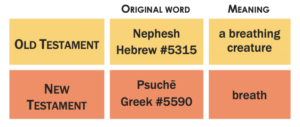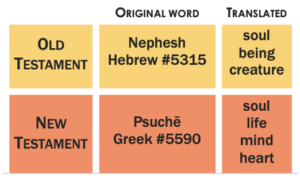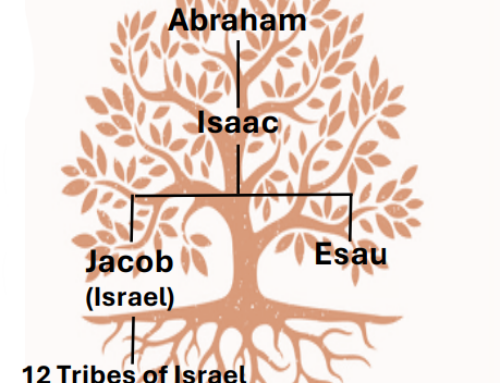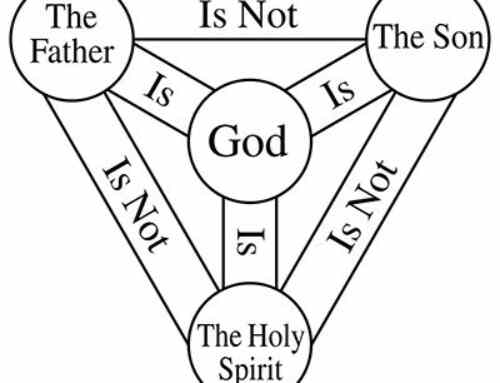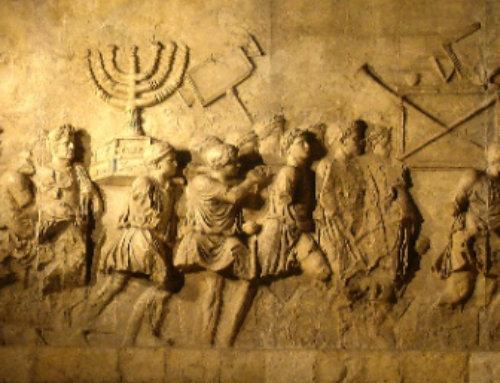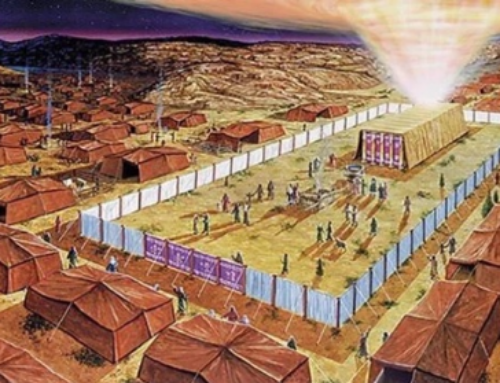The Human Soul
Goal of this Study: WHAT is the world’s view of the “soul”? WHAT is the biblical teaching of the “soul”?
HOW do we know a “soul” is not an invisible and immortal part of a human being?
WHAT are some scriptures that teach a soul is a combination of a body and the “breath of life”?
WHAT are some scriptures that seem to support a soul being an invisible and immortal part of a human?
WHY is it important for Jesus’ followers to have an accurate understanding of what a “soul” is?
Additional references: Studies in the Scriptures, Vol. 5 Chap. 12
What is a “soul” according to the world’s major religions?
| Hindu | Believes in an “atma” or soul that is invisible and immortal which at death leaves the body and enters into a new body. |
| Muslim | Believes that Allah created many souls (called “rooh” in Urdu) and put them into flesh bodies and sent them to earth to test whether they would remember and honor Allah. These souls are invisible and immortal and cannot be destroyed. |
| Buddhist | Believes in “atma” or the soul being invisible and immortal and the goal of life is “Nirvana” or “Moksha” (the release from the process of rebirth of the soul in other bodies, or reincarnation). |
| Roman Catholic |
Believes the soul to be invisible and immortal and that it leaves the body at death to face immediate judgment before God’s throne for its life. |
| Protestant | Believes the soul to be invisible and immortal and that the soul is said to “sleep” at death only to rise to life for a day of judgment where all who had accepted Jesus will be saved and go to heaven and all others will go to hell with fire and eternal torment. |
Two basic concepts are common across all of these beliefs:
- The soul is somehow tied to a person, but is invisible.
- The soul is immortal, meaning it carries on in some fashion after the body dies.
The concept of the immortality of the soul comes from Pagan thinking. The Egyptians had elaborate afterlife stories, and the ancient Greeks influenced beliefs, mostly through the philosophy of Plato. He said, “Death is merely the separation of the soul from the body.” One of his main arguments for a soul that does not die is the necessity of a future existence for an appropriate reward of the good and punishment of the wicked. This shows a lack of understanding of the purpose of resurrection and judgment.
What is the scriptural concept of a soul?
- Old Testament: The word “soul” is used extensively. Strong’s Exhaustive Concordance Hebrew #5315, nephesh, meaning “a breathing creature.”
- New Testament: The word “soul” is translated from Strong’s Exhaustive Concordance Greek #5590, psuchē, meaning “breath.”
The first use of the word “soul” is found early in the Bible:
- Genesis 2:7 (KJV) “And the LORD God formed man of the dust of the ground, and breathed into his nostrils the breath of life; and man became a living soul.”
The creation of Adam required two parts:
- First, his body was formed from “the dust of the ground.”
- Second, the “breath of life” had to be added to the body.
From this scripture, a simple equation can be pictured, defining what a “soul” is:
- Scripturally, humans were not created with a soul; they were created to be souls.
- Humans and animals are all referred to as souls, nephesh, creatures—the same word. Genesis 1:20–21. Based on this definition, even animals can be considered “souls,” as they have bodies and the “breath of life.”
- However, only man was created in God’s image. Of course, humans and animals aren’t the same, for God created man to “rule over” His animal creation
- Genesis 1:26 “Then God said, Let Us make man in Our image, according to Our likeness; and let them rule over the fish of the sea and over the birds of the sky and over the cattle and over all the earth, and over every creeping thing that creeps on the earth.”
The Apostle Paul also makes note of the distinctiveness of humans.
-
- Hebrews 2:7 (KJV) “Thou madest him a little lower than the angels; thou crownedst him with glory and honour, and didst set him over the works of thy hands.”
For more on this topic, see Studies in the Scriptures Vol. 1 Chap. 10 “Spiritual and Human Natures Separate and Distinct.”
- Sometimes, “soul” can also take on a further shade of meaning, to refer to the totality of one’s being. For example, Jesus talks with a man about what one must do to obtain salvation. The man’s answer indicates that one must love God with all one’s being—heart, mind and body/life (soul):
- Luke 10:27 “And he answered, You shall love the Lord your God with all your heart, and with all your soul [psuchē—one’s whole being; living, thinking body], and with all your strength, and with all your mind; and your neighbor as yourself.”
- The New Testament word for “soul” is shown to mean our life as a human creature and capable of dying.
- Acts 27:21–22 “When they had gone a long time without food, then Paul stood up in their midst and said, Men, you ought to have followed my advice and not to have set sail from Crete and incurred this damage and loss. Yet now I urge you to keep up your courage, for there will be no loss of life [psuchē—one’s whole being; living, thinking body] among you, but only of the ship.”
Translating psuchē as “life” here is appropriate because a shipwreck might very well cause your sentient being to die. It makes perfect sense. But this is the same Greek word that is used for “soul” as well. “No loss of life among you” means the loss of life was a possibility. That means your “soul” can die.
-
- Acts 15:25–27 “It seemed good to us, having become of one mind, to select men to send to you with our beloved Barnabas and Paul, men who have risked their lives [psuchē—one’s whole being; living, thinking body] for the name of our Lord Jesus Christ. Therefore we have sent Judas and Silas, who themselves will also report the same things by word of mouth.”
Barnabas and Paul risked their lives in these verses—but did they risk their “eternal souls” from traditional Christian belief? No, of course not. They risked their physical lives, but it is the same Greek word. These brothers had risked their human life, NOT their ultimate reward. If anything, such dangerous service would have enhanced their grasp of that reward, not put it at risk! If they had risked their lives for the sake of the gospel, God would have rewarded that.
- If the translators had put the word “soul” in these verses, it would have confused their traditional understanding of an immortal soul. “Life” and “soul” are scripturally interchangeable.
- The Scriptures are emphatic about the definitions of these words. Psuchē in the New Testament, nephesh in the Old Testament—both mean the breathing creature. The New Testament is in complete harmony with the Old Testament teaching regarding human beings BEING souls and not HAVING them.
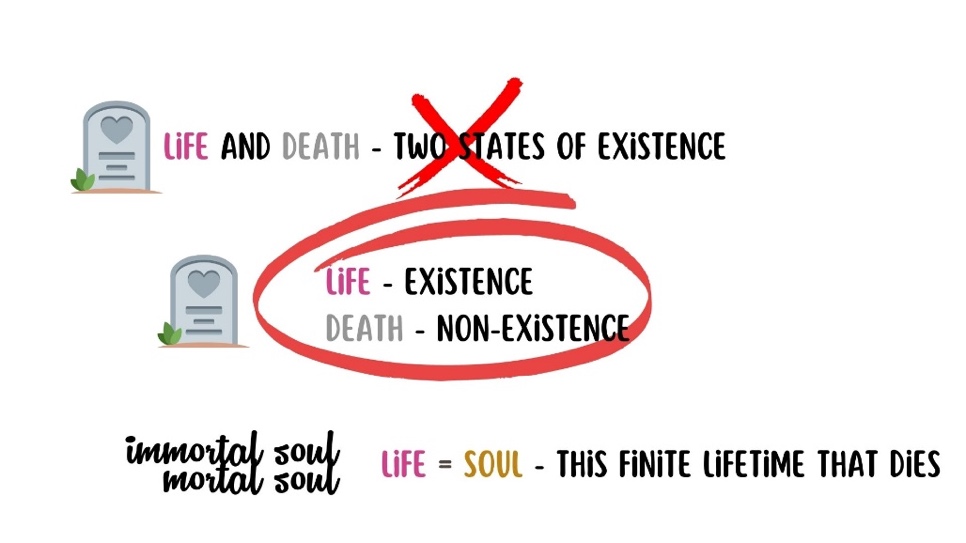 What is death?
What is death?
Some people are confused by the concept of death, saying life and death are two states of existence, rather than existence and non-existence.
Simply put, death is the absence of life; simple oblivion with no awareness or perceptions. This definition fundamentally contradicts the idea of an “immortal soul.” If mankind was immortal through their souls, then death itself, at least by this definition, is not possible.
Death is the consequence for disobedience committed by Adam and Eve. This punishment has been handed down through them to all of the generations of their descendants.
- Genesis 2:17 “But from the tree of the knowledge of good and evil you shall not eat, for in the day that you eat from it you will surely die.”
- Ecclesiastes 9:5, 6 “For the living know they will die; but the dead do not know anything, nor have they any longer a reward, for their memory is forgotten. Indeed their love, their hate and their zeal have already perished, and they will no longer have a share in all that is done under the sun.”
The phrase “they will no longer have a share in all that is done under the sun” may seem poetic, but it is also very straightforward. It should not be interpreted as the dead are observing the living but cannot interact with them, which would be in direct contradiction with the previous verse that tells us that “the dead do not know anything.”
- Ecclesiastes 9:10 “Whatever your hand finds to do, do it with all your might; for there is no activity, planning, knowledge, or wisdom in Sheol where you are going.”
The Hebrew word sheol is also translated as “the grave.” This verse brings out the lack of any activity for those who are dead.
- Job 7:9–10 “When a cloud vanishes, it is gone, so he who goes down to sheol does not come up. He will not return again to his house, nor will his place know him anymore.”
This simple yet poetic observation compares life to a cloud, in that once it “vanishes, it is gone.” Those who “go into the grave” (die) have no awareness and no ability to interact with the world.
Through these scriptures, death is understood to be a condition of oblivion. The “breath of life” is gone, and the body and mind cease to function. The concept of “resurrection” or “restitution” through God’s grace and Jesus’ sacrifice is that mankind will be restored from this condition of oblivion. This is fundamentally at odds with the concept of an existence beyond death as “an immortal soul.”
What are some scriptural arguments that support the biblical definition of a soul?
The Apostle Paul, reflecting on Genesis 2:7, compares Adam to Jesus, who he refers to as “the last Adam.”
- 1 Corinthians 15:45 “So also it is written, The first man, Adam, became a living soul. The last Adam became a life-giving spirit.”
Note Paul’s words here that Adam became a “living soul.” God first created Adam’s body, then “breathed” life into that body, and thus Adam BECAME a living, thinking being.
Note Paul’s words that “the last Adam,” Jesus, became a life-giving spirit;
-
- became: This word is critically important here. He wasn’t already an immortal, invisible being; he had to become one.
- life-giving: because Jesus’ sacrifice provides the means for the resurrection of mankind from the oblivion of death.
- a spirit: speaking of Jesus’ elevation from the physical plane of being to the divine plane of existence.
The Scriptures declare that a soul will die as a consequence of sin. This thought is in harmony with the previously examined account of Adam and Eve incurring the penalty of death for their disobedience to God’s commandment.
- Ezekiel 18:4 “Behold, all souls are Mine; the soul of the father as well as the soul of the son is Mine.
The soul who sins will die.”
“All souls are Mine” should not be interpreted as God declaring His possession of the immortal, invisible soul of the father and the son, or all people. God is declaring His power over mankind and their very existence. This is in harmony with the last sentence of the verse. If a soul were immortal, it could not be said “to die.”
The question is raised about whether a man will live again, or be resurrected/restored, after he dies.
- Job 14:14 “If a man dies, will he live again? All the days of my struggle I will wait until my change comes.”
Job’s question clearly defines a difference between death and life. If man possessed an immortal soul that lives on after death, there would not be a need for this question.
The phrase “I will wait until my change comes” demonstrates Job’s understanding that the only recovery from death is resurrection. He speaks of “waiting” in the condition of death for a “change,” namely, the hope of a resurrection from death.
What are some scriptures often cited in attempts to support the concept of an immortal soul? How do these scriptures harmonize with the thought of a soul as we have just learned?
Saul and the witch of Endor—1 Samuel 28:7–19
Saul, the King of Israel was looking for advice. He visited a woman who was labeled as a witch. During the exchange, Saul asks the woman to contact Samuel, a prophet of God who, at this point, had been dead for some time (verse 11). Subsequently, the woman claims to not only see Samuel’s spirit, but purports to then serve as a “medium” for Samuel’s spirit. In so doing, she delivers a message “from Samuel” to Saul (verses 13–19). Saul believes the woman and the words spoken to him (verse 20).
- Many believe this account is scriptural proof that Samuel’s “spirit” or “soul” spoke to the woman after his death to deliver a message to Saul. This account is therefore sometimes cited as scriptural proof that humans possess an immortal, invisible soul that lives on after death.
- The key to understanding this account is in verse 14. Saul asks the woman about the form of the “vision” she claimed to see. The woman, understanding that Saul is looking for Samuel, responds with a description of him. Saul does not see anything.
- She gives a vague description of “an old man wrapped with a robe” and Saul makes an assumption. Verse 15 indicates that Saul “perceived” that the vision was Samuel, but perception is often not reality.
- Saul was convinced he was speaking to the prophet – he was blinded by his own ambition, need and fear. In his exhaustion and worry over the threat of the Philistines and God being far from him due to his disobedience, he sought the comfort and familiarity of his mentor.
- The witch living in a cave (compare with Matthew 8:28–34) and said to “commune with the dead,” was perhaps similarly possessed. Demons try to sow confusion regarding God’s plan. What better way to sow confusion than to “speak” to the King of Israel? Certainly, a demon seeking to do so would need to present itself as someone Saul would trust, like Samuel, in order to have its message believed.
- Additionally, 1 Samuel 16:14, set before this encounter, states that because of Saul’s disobedience to God, “an evil spirit terrorized him.” This adds strength to the thought that later, when Saul disobeys God’s commandments regarding spiritism by seeking advice from the witch, his perceptions and beliefs were influenced by the evil spirit. If anything, it was a demon (a fallen angel) who talked to Saul through the woman, not the deceased Samuel.
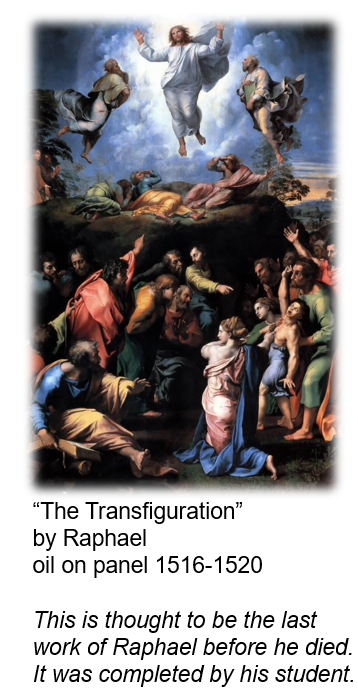 See Reprint 4976 for more on this encounter.
See Reprint 4976 for more on this encounter.
Jesus and the Transfiguration—Matthew 17:1–3
- Matthew 17:1–3 “Six days later Jesus took with him Peter and James and John his brother, and led them up on a high mountain by themselves. And he was transfigured before them; and his face shone like the sun, and his garments became as white as light.
And behold, Moses and Elijah appeared to them, talking with him.”
Some use this scriptural account as proof of the immortal soul. If Moses and Elijah appeared with Jesus, as witnessed by the apostles, it is concluded that Moses and Elijah had (or have) immortal souls that survived after death.
- Matthew 17:9 “As they were coming down from the mountain, Jesus commanded them, saying, “Tell the vision to no one until the Son of Man has risen from the dead.”
Notice Jesus’ words to the apostles, as they leave the mountain on which this encounter took place. Jesus explains that this encounter was a vision. The Bible has many other accounts of people experiencing visions sent by God. Some of the most well-known examples are:
-
- Genesis 28:10–16 Jacob’s dream of “the ladder to heaven.”
- Acts 10:9–17 Peter’s vision of the unclean and clean animals. (Also see Acts 9:10–12.)
These visions did not mean that ladders or animals actually manifested themselves.
Consider how the apostles would have had no way of knowing what Moses or Elijah actually looked like. Their recognition of Moses and Elijah was part of the vision experience enabled by God.
The Criminal on the Cross—Luke 23:42
Luke 23 chronicles Jesus’ trial and crucifixion. Jesus was crucified with two other people, referred to as “criminals.” As they are hanging on the cross, one of the criminals asks Jesus to remember him:
- Luke 23:42 “And he was saying, ‘Jesus, remember me when you come in your kingdom!’”
- Luke 23:43 “And he [Jesus] said to him, ‘Truly I say to you, today you shall be with me in Paradise.’”
Many translations put the comma before the word “today.” In other words, “I say to you, here’s what’s going to happen today.” Some Christians use this verse, to support the idea of the immortal soul. Their thinking is that the criminal asks Jesus specifically for a place in his heavenly Kingdom. Jesus’ response is interpreted as him telling the criminal that after they both die, their souls will meet in heaven.
An alternative interpretation is that as he is dying on the cross, the criminal notices the sign that had been nailed above Jesus’ head “THIS IS THE KING OF THE JEWS.” In his despair, perhaps, the criminal asks Jesus to remember him when Jesus arrives at his Kingdom. (There is no indication that the criminal expected Jesus’ Kingdom to be a heavenly Kingdom.)
Punctuation was added by the various translators, not the original writers or the Divine Author, God Himself. Translations, such as Wilson’s Diaglott show the comma in a different place:
- Luke 23:43 (diaglott) “And said to him, Indeed I say to thee this day, thou shalt be with me in Paradise.”
 Jesus knew his death would soon provide the ransom price for mankind, opening the
Jesus knew his death would soon provide the ransom price for mankind, opening the
way for all—including the criminal—to one day be resurrected to human perfection.
By any definition, this would be a “paradise.”
The change of the comma’s position puts the emphasis on the first phrase of Jesus’ sentence, indicating that Jesus is telling these words to the criminal today. Jesus has
been terribly disgraced by the Jewish leadership. He has been tried and convicted of
a capital offense by the Roman government. He has been crucified. It certainly does not look promising that he would be a king or have a kingdom, because in a few hours he will be dead. He’s saying, in other words, “Look, no matter what it looks like, no matter how bleak the circumstances are, I am assuring you I am a King and will have a Kingdom. Today it looks dark; it looks hopeless. Put these outward circumstances aside—don’t focus on them. Focus on my Kingdom.”
This is the day (“today”) Jesus would complete the sacrifice he agreed to make which was absolutely critical for human salvation, including the salvation of the thief. We know Jesus did not go to heaven, as he was in the tomb for parts of three days.
Why is it important for God’s followers to have an accurate understanding of what a soul is?
An “immortal soul” invalidates some of the most fundamental aspects of God’s plan.
- Adam was created in a perfect human condition with the opportunity to live forever. However, this condition was dependent on obedience to God. Disobedience to God is sin, and the punishment for disobedience and sin is death. This was clearly communicated to Adam and Eve, the first man and woman.
- Genesis 2:16–17 “The LORD God commanded the man, saying, ‘From any tree of the garden you may eat freely; but from the tree of the knowledge of good and evil you shall not eat, for in the day that you eat from it you will surely die.’”
- Before ancient Egypt with their elaborate afterlife ideas, and ancient Greek philosophy and myths, where did this false concept of death NOT actually being the end of existence come from? It came from Scripture! The serpent (Satan) tells Eve the first and greatest lie ever told!
- Genesis 3:4 “The serpent [Satan] said to the woman, ‘You surely will not die!’”
- John 8:44 “He [Satan] was a murderer from the beginning, and does not stand in the truth because there is no truth in him. Whenever he tells a lie, he speaks from his own nature, because he is a liar and the father of lies.”
- In one exchange, God tells Adam that disobedience results in death, removal from life. In a second exchange, Satan tells Eve that disobedience will NOT result in death, which the concept of an immortal soul supports. Satan twisted God’s command by telling Eve she would NOT die, the complete opposite of what God said would happen. Listen to me instead of God! He took something true and changed the fundamental consequences. How many world religions, including a majority of Christianity, support this lie that people really do not die?
The concept of an “immortal soul,” therefore, supports Satan’s lie, not God’s commandment!
 God permitted Adam and Eve’s disobedience so they, and through
God permitted Adam and Eve’s disobedience so they, and through
them all mankind, could learn that obedience to God’s ways is best,
and the only way to life. If mankind possesses an immortal soul that cannot die, this entire lesson becomes impossible.- The fundamental theme of the Bible is mankind’s disobedience to God, followed by the restitution from that condition, as enabled by the ransom price paid by Jesus. “Paradise lost to paradise found.” An immortal soul implies that God’s penalty against sin did NOT go into effect because a part of you never actually dies. Death, far from being the sentence or curse upon our race, is just a temporary door you pass through. If our souls already have eternal life, what was the purpose of Jesus dying on our behalf?
There would be no need for salvation from death. This casts confusion and contradiction upon an understanding of the Bible by calling into question the need for its fundamental theme.- 1 Corinthians 15:22 “As in Adam all die [actually die in the grave, a cessation of existence],
also in Christ will all be made alive.”
- 1 Corinthians 15:22 “As in Adam all die [actually die in the grave, a cessation of existence],
The ideas of hauntings and “life after death” are widespread in modern culture. How should God’s followers react to these ideas, even if we know them to be fiction?
Scriptures (such as Job 7:9–10–previously examined) clearly teach that the dead cannot communicate with the living or return to the places in which they once lived. However, popular culture and society frequently feature stories or “accounts” of hauntings and other “communications with the dead.” When considering what reaction to take regarding these types of media, consider the following:
- Jesus clearly taught that in order to please God, one’s actions alone are not enough. In Matthew 5:27–28, Jesus points out that the intentions of one’s thoughts are just as important as one’s actions. To truly please God, one must love God’s ways, and not just follow His laws out of a sense of duty.
- Matthew 6:21 “for where your treasure is, there your heart will be also.”
- Paul stresses the importance for Jesus’ followers to constantly focus their minds on themes pleasing to God.
- Philippians 4:8 “Finally, brethren, whatever is true, whatever is honorable, whatever is right, whatever is pure, whatever is lovely, whatever is of good repute, if there is any excellence and if anything worthy of praise, dwell on these things.”
- Psalm 1 stresses the importance of focusing our minds and thoughts on God’s truth to the best of our abilities. Those who do so will “bear fruit,” meaning, produce works and conditions pleasing to God.
- Thoughts have a direct impact on our actions, hearts, and overall outlook. When we choose to focus our attention on ideas or stories that are not rooted in truth, and even if we recognize them as false and seemingly harmless, we still place our minds in a vulnerable position. Over time, these influences can subtly shift our thinking and draw our hearts away from God.
- Brother Russell considered this topic to be so important for Jesus’ followers that he included wordings regarding it in the Daily Vow: “I vow to still more carefully, if possible, scrutinize my thoughts and words and doings, to the intent that I may be the better enabled to serve Thee, and Thy dear flock. I vow to Thee that I will be on the alert to resist everything akin to Spiritism and Occultism, and, remembering that there are but the two masters, I shall resist these snares in all reasonable ways as being of the adversary.”
Concluding Summary
Although it has been widely accepted throughout mankind’s history, the concept of human beings possessing an invisible and immortal soul that survives on after death is not scripturally supported. In fact, such a teaching undermines the basic foundation truth of the Bible regarding mankind’s disobedience to God and need for restitution. The claim that mankind has an immortal soul further invalidates the need for a ransom and brings an unacceptable diminishing of the magnitude of the great price Jesus paid to redeem mankind. Through the Scriptures and through God’s grace, we are able to discern the truth of God’s word. In so doing, we can see the harmony of all parts of the Scriptures. In the fullness of God’s plan, all mankind will be given this opportunity as well and be able to finally appreciate the magnitude of God’s justice, power, wisdom and love; and have a correct and full appreciation of the salvation work enabled by Jesus.
“And He will wipe away every tear from their eyes;
and there will no longer be any death;
there will no longer be any mourning, or crying, or pain;
the first things have passed away.”
Revelation 21:4




